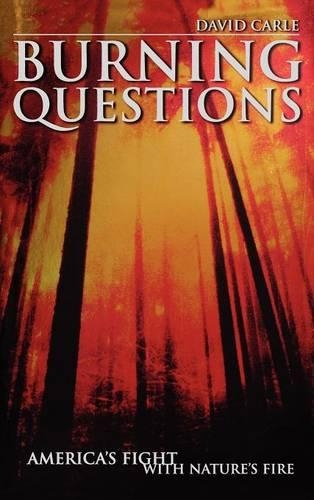
Burning Questions: America's Fight with Nature's Fire
(Hardback)
Publishing Details
Burning Questions: America's Fight with Nature's Fire
By (Author) David Carle
Bloomsbury Publishing PLC
Praeger Publishers Inc
30th March 2002
United States
Classifications
Tertiary Education
Non Fiction
Conservation of wildlife and habitats
Forestry and silviculture
639.90973
Physical Properties
Hardback
312
Width 156mm, Height 235mm
680g
Description
Carle explores 100 years of controversy over prescribed burning--using fire as a tool--and fire suppression, using the voices of early advocates and today's proponents to examine the strategy of controlled burning. A burning mix of diesel fuel and gasoline drips from handheld canisters onto the ground. Slowly a line of fire begins to creep downhill. The flames are well behaved, almost hesitant. This is a backing fire, unlikely to attract media attention unless it escapes, like the disastrous Los Alamos "Cerro Grande" fire did in 2000. This book explores a century of controversy over prescribed burning--using fire as a tool--and fire suppression. For more than 100 years, America waged an all-out war against wildland fire. Decades of fire suppression caused fuels to build up at alarming levels in our forests, culminating in the increasingly severe, uncontrollable fires of the late 20th century--the fires in Yellowstone, the Oakland Hills, and Los Alamos and the fires in summers of 2000 (the second worst fire season in the nation's history) and 2001. Looking at these and earlier fires, Carle uses the voices of those who were involved, of those who were early advocates, and of today's proponents to examine the role of controlled burning. Early in the century, Harold Biswell, a pioneer in prescribed burning, dared to commit the heresy of questioning the dogma of fire suppression, despite professional controversy and opprobrium, he and a few other pioneers led the way. Their roles play an integral part in the story told here. In Biswell's words, "fire is a natural part of the environment, about as important as rain and sunshine...We must work more in harmony with nature, not so much against it." Can humanity, this book asks, learn to become a fire-adapted species
Reviews
"Endorsement From Bruce Babbitt Former Secretary of the Interior: An important and timely work of wildland fire history. The voices in this book warn us about past mistakes that we must not repeat. Endorsement From James Agee Professor of Forest Ecology University of Washington: Carle joins Ashley Schiff and Stephen Pyne as the preeminent fire historians of America. At a time when we are suffering the consequences of a century of fire suppression, Carle brings forth for the first time the story of the Western fire ecology pioneers, who began fighting for a more rationale fire policy in our Western fire environments. The careers of Harold Weaver and Harold Biswell, spun within the suffocating context of 20th century fire suppression, will be inspiring for new generations of fire managers and scientists. Endorsement From Bruce M. Kilgore Retired from the National Park Service Formerly Associate Regional Director Science and Resources Management Western Region, NPS: Carle has done a great job of covering the story of the evolution of fire suppression to RX fire management over the past century. A lively narrative style picks up individual historical comments and conveys attitudes that portray the essential roles the Harolds and Komareks played in setting forth fires various functions in Southern and Western ecosystems. The patience and persistence of Biswell and Weaver and their students and colleagues in Park Service and Forest Service are finally given fair recognition! And the stories of the 1910 fires, the 1988 Yellowstone fires, Oakland 1991, and the Cerro Grande fire of 2000 are all included! Endorsement From Jack Ward Thomas Chief Emeritus, U.S. Forest Service Boone and Crocket Professor of Wildlife Conservation University of Montana: The nation is in its early stages of what could be called a 'paradigm shift' related to how both wildfire and controlled burning are addressed in natural resources management. This shift has been a long time coming and David Carle documents those changes through the stories of the pioneers in fire ecology and controlled burning and their disciples--and in a most entertaining fashion.
Author Bio
DAVID CARLE was a state park ranger in California for 27 years. Before retiring in 2000, he was at the Mono Lake Tufa State Reserve, where he participated in the prescribed burn program at Mono Lake. He also taught biology at Cerro Coso Community College. Now a freelance writer, he is the author of Drowning the Dream: California's Water Choices at the Millennium (Praeger, 2000) and Mono Lake Viewpoint (1992).
